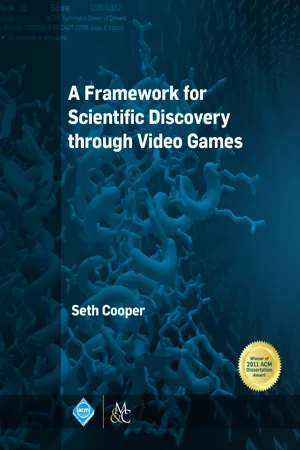
- 133 pages
- English
- ePUB (mobile friendly)
- Available on iOS & Android
eBook - ePub
A Framework for Scientific Discovery through Video Games
About this book
As science becomes increasingly computational, the limits of what is
computationally tractable become a barrier to scientific progress. Many
scientific problems, however, are amenable to human problem solving skills
that complement computational power. By leveraging these skills on a larger
scale---beyond the relatively few individuals currently engaged in
scientific inquiry---there is the potential for new scientific discoveries.
This book presents a framework for mapping open scientific problems into
video games. The game framework combines computational power with human
problem solving and creativity to work toward solving scientific problems
that neither computers nor humans could previously solve alone. To maximize
the potential contributors to scientific discovery, the framework designs a
game to be played by people with no formal scientific background and
incentivizes long-term engagement with a myriad of collaborative or
competitive reward structures. The framework allows for the continual
coevolution of the players and the game to each other: as players gain
expertise through gameplay, the game changes to become a better tool.
The framework is validated by being applied to proteomics problems with the
video game Foldit. Foldit players have contributed to novel discoveries in
protein structure prediction, protein design, and protein structure
refinement algorithms. The coevolution of human problem solving and computer
tools in an incentivized game framework is an exciting new scientific
pathway that can lead to discoveries currently unreachable by other methods.
Frequently asked questions
Yes, you can cancel anytime from the Subscription tab in your account settings on the Perlego website. Your subscription will stay active until the end of your current billing period. Learn how to cancel your subscription.
No, books cannot be downloaded as external files, such as PDFs, for use outside of Perlego. However, you can download books within the Perlego app for offline reading on mobile or tablet. Learn more here.
Perlego offers two plans: Essential and Complete
- Essential is ideal for learners and professionals who enjoy exploring a wide range of subjects. Access the Essential Library with 800,000+ trusted titles and best-sellers across business, personal growth, and the humanities. Includes unlimited reading time and Standard Read Aloud voice.
- Complete: Perfect for advanced learners and researchers needing full, unrestricted access. Unlock 1.4M+ books across hundreds of subjects, including academic and specialized titles. The Complete Plan also includes advanced features like Premium Read Aloud and Research Assistant.
We are an online textbook subscription service, where you can get access to an entire online library for less than the price of a single book per month. With over 1 million books across 1000+ topics, we’ve got you covered! Learn more here.
Look out for the read-aloud symbol on your next book to see if you can listen to it. The read-aloud tool reads text aloud for you, highlighting the text as it is being read. You can pause it, speed it up and slow it down. Learn more here.
Yes! You can use the Perlego app on both iOS or Android devices to read anytime, anywhere — even offline. Perfect for commutes or when you’re on the go.
Please note we cannot support devices running on iOS 13 and Android 7 or earlier. Learn more about using the app.
Please note we cannot support devices running on iOS 13 and Android 7 or earlier. Learn more about using the app.
Yes, you can access A Framework for Scientific Discovery through Video Games by Seth Cooper in PDF and/or ePUB format, as well as other popular books in Computer Science & Computer Science General. We have over one million books available in our catalogue for you to explore.
Information
Table of contents
- Cover
- About The Book
- Title Page
- Copyright Page
- Dedication
- Contents
- Preface
- Chapter 1 Introduction
- Chapter 2 Related Literature
- Chapter 3 Framework
- 3.5 Rewards and Social Interaction
- 3.6 Conclusion
- Chapter 4 Protein Structure Prediction
- Chapter 5 Protein Design5.1 Introduction
- Chapter 6 Protein Structure Refinement Algorithms
- Chapter 7 Conclusion
- Bibliography
- Author’s Biography